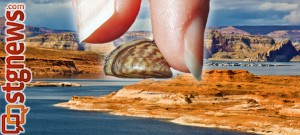
SALT LAKE CITY – The recent discovery of 14 adult mussels in Lake Powell and continuing spread throughout neighboring states has prompted a decontamination order for all Utah boaters leaving Lake Powell. Since 2009, boats launching on Lake Powell have been required to comply with Glen Canyon National Recreation Area’s zebra mussel prevention program by obtaining and displaying a mussel free certificate before launching.
Greg Sheehan, director of the Utah Division of Wildlife Resources, signed the order – requiring boats to be decontaminated before leaving the lake – in an effort to lessen the chance of mussels being transported to bodies of water in Utah.
“We’re doing everything we can to keep quagga and zebra mussels out of Utah,” said Larry Dalton, aquatic invasive species coordinator for the Utah DWR. “If mussels ever establish themselves here, they could do millions of dollars in damage to water delivery systems. They could also affect the state’s recreation areas and fishing, and damage boats.”
When quagga and zebra mussels invade waters, they clog power plant and public water intakes and pipes. They colonize pipes, constricting flow and reducing the intake in heat exchangers, condensers, firefighting equipment and air conditioning and cooling systems.
Navigational and recreational boating can also be affected by mussels. Small mussels can get into engine cooling systems, causing overheating and damage. Navigational buoys have sunk because of the weight of attached mussels. Fishing gear can be fouled if left in the water for long periods of time. Deterioration of dock pilings increases if encrusted with these mussels, as well as corrosion of steel and concrete, affecting structural integrity.
Quagga and zebra mussels also damage the ecosystems they invade. They feed by filtering water and removing large amounts of food, starving native species in infested rivers and lakes. The waste they produce accumulates and degrades the environment, using up oxygen, making the water acidic and producing toxic byproducts. These pollutants can be passed through the food chain if the mussels are consumed.
Mussels were first discovered in the United States in 1986 and have since spread to lakes and rivers in many states, including Nevada, California and Arizona.
They primarily spread by attaching themselves to boats and trailers. If your boat has been in infested waters, it could be carrying quagga or zebra mussels on its hull. Their microscopic larvae can also be unintentionally transported in water held in live wells, bilges or bait buckets.
All boats entering Utah waters must also be decontaminated before launch.
Clean, drain and dry
Quagga and zebra mussels move from water to water by attaching themselves to boats and other equipment that comes in contact with the water.
Cleaning, draining and drying your boat and any recreational equipment that comes in contact with the water is the key to eliminating the mussels. “You can do this yourself,” Dalton said, “and it won’t cost you a thing.”
Follow these three steps to clean, drain and dry your boat:
(1) Remove all of the plants, mud or animals (attached mussels or fish) from your boat’s exterior and interior by wiping the exterior and interior clean.
(2) Drain all the water from places in your boat where it may have accumulated. This includes the ballast tanks, the bilge, live wells and the motor. Even coolers that contain water from the lake should be drained.
The first two steps should be done immediately after pulling your boat out of the water and up the launch ramp. “Doing these steps should become as routine as securing your boat to its trailer,” Dalton said. “Make sure you do them every time.”
(3) Finally, dry your boat and all the equipment that got wet (water toys, anchor or tie ropes and the anchor chest) at home or where you store it for the following length of time:
Months Dry time
March, April and May 18 days
June, July and August 7 days
September, October and November 18 days
December, January and February 30 days
Temperatures that drop below 32 degrees Fahrenheit for three straight days will also kill the mussels.
If you want to get your boat on the water before the drying times allow, you’ll have to get it professionally decontaminated. “Decontamination equipment is available at most of Utah’s popular boating waters,” Dalton said, “and the service is typically free.”
When you get your boat decontaminated, a certified operator will wash it inside and out with scalding hot water (140 degrees Fahrenheit). He or she will also use the same hot water to flush the raw water circulation systems on your boat.
Boaters can decontaminate their vessels on their own or consult a professional.
“The order (requiring decontamination before leaving Lake Powell) will stay in place as long as there are mussels in Lake Powell,” Dalton said.
Resources
Utah DWR’s decontamination instructions (as set forth above)
Utah DWR’s list of decontamination units
Utah DWR’s decontamination certification form, required to launch on Utah waters
Glen Canyon National Recreation Area’s Lake Powell zebra mussel advisory, policy and requirements
Report derived in part from press releases submitted by Utah Division of Wildlife Resources, Nevada Fish and Wildlife Office
UPDATED 5:06 p.m. Clarification that the new order pertains to boats leaving Lake Powell; decontamination and certification requirements before launching on Lake Powell are not new. Steps for decontamination added, supplementing the link first provided.
Email: [email protected]

If they are in Lake Powell does that mean that all points down stream are infested as well?